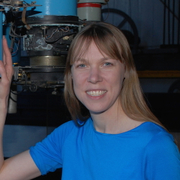- Level Foundation
- Duration 6 hours
- Course by The University of Edinburgh
-
Offered by

About
"How do they know that?" Modern astronomy has made some astonishing discoveries - how stars burn and how black holes form; galaxies from the edge of the universe and killer rocks right next door; where the elements come from and how the expanding universe is accelerating. But how do we know all that? The truth is that astronomy would be impossible without technology, and every advance in astronomy is really an advance in technology. But the technology by itself is not enough. We have to apply it critically with a knowledge of physics to unlock the secrets of the Universe. Each week we will cover a different aspect of Astronomical technology, matching each piece of technology to a highlight science result. We will explain how the technology works, how it has allowed us to collect astronomical data, and, with some basic physics, how we interpret the data to make scientific discoveries. The class will consist of video lectures, weekly quizzes, and discussion forums. Each week there will be five videos, totalling approximately 40 minutes. They will be in a regular pattern - a short introduction, an example science story, an explanation of the key technology area, a look at how the technology is used in practice, and finally a look at what the future may hold.Modules
WEEK 1: Science and Technology
1
Assignment
- Week 1 quiz
4
Videos
- W1 Part 1 - Our Knowledge of the Universe
- W1 Part 2 - Revolutions in Astronomy
- W1 Part 3 - Why Astronomy is Hard
- W1 Part 4 - The Horse and Cart
2
Readings
- Welcome to Week 1
- Additional Information for Week 1
WEEK 2: Telescopes and Stars
1
Assignment
- Week 2 quiz
5
Videos
- W2 Part 1 - Picturing the Universe
- W2 Part 2 - The Sun - is every star like it?
- W2 Part 3 - How Telescopes Work
- W2 Part 4 - We are Stardust
- W2 Part 5 - Even Bigger Telescopes?
2
Readings
- Welcome to Week 2
- Additional Information for Week 2
WEEK 3: Space and Black Holes
1
Assignment
- Week 3 quiz
6
Videos
- W3 Part 1 - Our Enemy the Atmosphere
- W3 Part 2 - Hunting for Black Holes
- W3 Part 3 - Rockets, Spacecraft, and Orbits
- W3 Part 4 - Hunting for Black Holes Part II
- W3 Part 5 - Can Space Missions get Cheaper?
- W3 Bonus video - A Sense of Scale
3
Readings
- Welcome to Week 3
- Geostationary Orbits
- Additional Information for Week 3
WEEK 4: Detectors and The First Galaxies
1
Assignment
- Week 4 quiz
6
Videos
- W4 Part 1 - Catching the Light from the Stars
- W4 Part 2 - Galaxies since the Dawn of Time
- W4 Part 3a - Light, Matter, and CCDs
- W4 Part 3b - Infrared Detectors
- W4 Part 4 - Galaxies since the Dawn of Time Part II
- W4 Part 5 - Another Revolution in Detector Technology?
2
Readings
- Welcome to Week 4
- Additional Information for Week 4
WEEK 5: Computers and Killer Rocks
1
Assignment
- Week 5 quiz
5
Videos
- W5 Part 1 - Computers Everywhere
- W5 Part 2 - Killer Rocks
- W5 Part 3 - Computers, Databases, and the Internet
- W5 Part 4 - Killer Rocks Part II
- W5 Part 5 - Hitting the Buffers?
3
Readings
- Welcome to Week 5
- Big numbers: Megaparsecs, Petabytes, and all that Jazz
- Additional Information for Week 5
WEEK 6: Spectroscopy and Dark Energy
1
Assignment
- Week 6 quiz
5
Videos
- W6 P1 - Light, Atoms, and Motion
- W6 P2 - The Accelerating Universe and Dark Energy
- W6 P3 - How Spectrographs Work
- W6 P4 - Dark Energy Part II
- W6 P5 - A Perfect Spectrograph?
4
Readings
- Welcome to Week-6
- Additional Information for Week 6
- Post-Course Survey
- Equalities Monitoring Form
Auto Summary
Discover the fascinating world of modern astronomy with "AstroTech: The Science and Technology behind Astronomical Discovery." This foundational course, instructed by experts on Coursera, explores how advanced technology and physics unlock the universe's secrets. Through engaging video lectures, weekly quizzes, and discussion forums, you'll learn about key astronomical technologies and their scientific impacts. Ideal for science and engineering enthusiasts, the course spans 360 minutes and offers a starter subscription option. Dive into the cosmos and uncover the mysteries of stars, black holes, and galaxies!

Andy Lawrence

Catherine Heymans


